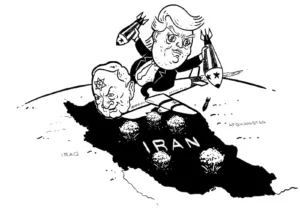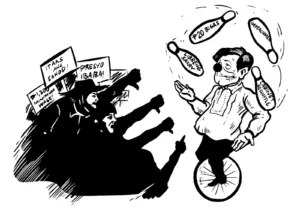By JOSE MARIA SISON
Founding Chairman
Communist Party of the Philippines
Contribution to the International Communist Seminar
Brussels, Belgium
4 – 6 May 2007
I propose to discuss the objective conditions and subjective factors that brought about the October Revolution, the continuing validity of the October Revolution despite the disintegration of the Soviet Union and other revisionist-ruled societies and the validity and relevance of the October Revolution in dealing with the conditions of the 21st century.
By JOSE MARIA SISON
Founding Chairman
Communist Party of the Philippines
Contribution to the International Communist Seminar
Brussels, Belgium
4 – 6 May 2007
I propose to discuss the objective conditions and subjective factors that brought about the October Revolution, the continuing validity of the October Revolution despite the disintegration of the Soviet Union and other revisionist-ruled societies and the validity and relevance of the October Revolution in dealing with the conditions of the 21st century.
1. Objective conditions and subjective factors that brought about the October Revolution
Since the beginning of the 20th century, the world had entered the era of modern imperialism and proletarian revolution. Monopoly capitalism became dominant in the advanced capitalist countries. Finance capital was born out of the merger of bank and industrial capital. The export of surplus capital was gaining importance over the export of surplus goods.
Monopoly firms of the imperialist countries combined and competed with each other through cartels, syndicates and alliances. The colonial and imperialist powers had divided the rest of the world as colonies, semi-colonies and dependent countries in political terms and as sources of raw materials, markets, fields of investment and spheres of influence in economic terms. And yet they continued to struggle for a redivision of the world in accordance with the changing balance of forces among them.
Like the bourgeoisie in the era of free competition capitalism, the monopoly bourgeoisie used the slogan of "free trade" to penetrate foreign markets and expand their direct and indirect investments abroad. But in their competition, the imperialist powers in fact became increasingly protectionist economically and aggressive politically. They were driven by their national self-interest towards the first inter-imperialist war, World War I.
Kautsky and his followers who became dominant in the Second International interpreted the global expansion of imperialist capital as a continuous unilinear process for dissolving pre-capitalist formations and effecting industrial capitalist development in the backward countries. But Lenin correctly pointed to the uneven and spasmodic development of capitalism, the recurrent and worsening crises of overproduction and the decadent, aggressive and destructive character of imperialism.
He opposed the opportunist and revisionist line of Kautsky, which promoted social chauvinism, social pacifism and social imperialism. Having grasped well the lessons of the Paris Commune and the necessity of bringing about the dictatorship of the proletariat through the class struggle, he was well prepared to lead the Bolsheviks, the proletariat and the people in realizing the Great October Socialist Revolution in Russia,
This huge country with a few islands of industrial development amidst an ocean of feudalism and medievalism was the weakest among the imperialist powers and was itself an object of penetration and manipulation by the stronger competing imperialist powers. At the same time, it was a real giant oppressor of nations and peoples within the Russian empire. The proletariat and the people had to contend with Czarism, representing feudalism and medievalism, and also with the bourgeoisie dominating the modern industrial sector and trying to head off the revolution.
Lenin saw the impoverished and desperate conditions of Russia as favourable for the advance of the Bolshevik party as the revolutionary party of the proletariat, leading the broad masses of the people to overthrow Czarism and install the democratic republic, rallying the peasant masses as the massive reliable ally of the proletariat through the nationalization of land and land reform and militating the proletariat with the demand for an 8-hour workday.
Lenin was ever conscious of the need to carry out a two-stage revolution, where democracy must first be won against feudalism and repression and where socialism must be subsequently established and developed. For the working class to lead such two-stage revolution, it must be able to build the Red Army and mobilize the people to smash the military and bureaucratic machinery of the counterrevolutionary state. It must rely on the worker-peasant alliance, including the soldiers of worker and peasant origin. Thus, the Bolsheviks succeeded in defeating Czarism and then the bourgeoisie and in building the first sustainable socialist country on one-sixth of the face of the earth.








